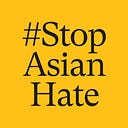Dreaming Beyond #StopAsianHate
How Grace Lee Boggs inspires me to ‘reimagine everything’
“The time has come for us to reimagine everything… It’s up to us to reimagine the alternatives and not just protest against them and expect them to do better.”
— Grace Lee Boggs
I first learned about Grace Lee Boggs as a junior in college. I was attending Seattle University, and was a self-professed bookworm, poet, and underground hip-hop devotee. Like so many other Asian American millennials, I never felt truly represented in mainstream music (besides Michelle Branch… girl, I love you!). While I dreamt of being a recording artist or Broadway star, I felt certain a career in entertainment was out of reach; as a mixed Chinese American girl with a lisp, I just didn’t fit the description. I buried myself in books, scribbled verse, and obsessively memorized the lyrics of local hip-hop artists like Blue Scholars and Abyssinian Creole. Their poetry over beats gave me a glimmer of hope that one day I could tell my story out loud, too.
It was my great fortune that in the first few weeks of my freshman year, I fell into a scrappy, multigenerational writing circle of spoken word poets and hip-hop artists that met every Thursday night at the Langston Hughes Performing Arts Center in Seattle’s Central District. We free-wrote together, read our newly hatched words aloud, and later freestyle rapped in cyphers — standing in a circle, sometimes with someone beatboxing but more often a cappella — where we took turns loosening our mouths and self-consciousness and let rhyme pour out into the open. Week after week, my confidence as a writer and a lyricist grew, and I fell deeper in love with the storytelling and raw honesty of rap and spoken word.
When my best friend Maddy and I started performing together as a hip-hop duo called Canary Sing, the local Seattle scene took notice, and the rappers I idolized eventually became my mentors and friends. One of those MCs, Gabriel Teodros, invited me to the Hidmo, which he always called “a community center and all-ages venue cleverly disguised as an Eritrean restaurant.” The restaurant was owned by two immigrant sisters, Rahwa and Asmeret Habte, who saw an opportunity to bridge their Eritrian heritage with their love for hip-hop and activism. Yes, there was injera and steaming combo plates of perfectly spiced lentils and lamb, but it was also a hub for a beautiful spectrum of grassroots artists and organizers. Before “intersectional” was a buzzword, the Hidmo held space for all manner of marginalized communities and identities to be centered and find grounding in the form of showcases, open mics, and just hanging out. Queer people of color — particularly Black, Filipino, and Pacific Islander folks — led nearly all of the programming, and they invited artists from all over the country and globally to use the Hidmo as home base. From Toronto to London to the Gaza Strip, Hidmo hosted shows by artists who saw their activism and artistry as one and the same, creativity and social change in brilliant symbiosis.
A revolution that is based on the people exercising their creativity in the midst of devastation is one of the great historical contributions of humankind.
— Grace Lee Boggs
One night in 2008, my band Canary Sing opened for Invincible, a touring MC from Detroit. Their flow was impeccable, and the intention in their words deeply rooted. At one point during their set, they evoked Grace Lee Boggs, a mentor of theirs in Detroit. It was a quiet thrill for me to hear Invincible call out this Asian American elder as a leader and inspiration to their work. Invincible underscored Boggs’ call to artists to see themselves as central to the work of changing the world — that the artist could indeed be revolutionary.
I had long before let go of the hope or even the desire of being “represented” in mainstream media and popular culture. Having read the work of so many revolutionaries, from Assata Shakur to bell hooks to Angela Davis, I had never heard of a Chinese American elder mentioned in the company of Black liberation fighters. Learning of the very existence of a celebrated Asian American community organizer was just the type of affirmation I needed.
Fast forward to 2021. I’ve been an independent artist for over a decade, incidentally accruing a Grammy nomination in collaboration with another one of my favorite local Seattle rappers-turned-friends, Macklemore, along the way. I’ve moved to Los Angeles to grow my career in music as a songwriter, with the dream that I can imbue pop culture with the grassroots ethos that made my college years so meaningful. But it’s a global pandemic — we’re isolated from that vital feeling of in-person community, and I’m questioning whether I even want to make music anymore. Was it a pipe dream to think that my politically driven artistry could make a dent in this industry? Should I just abandon music if it’s such a rat race just to pop above the fray? It’s a conservative estimate that 15,000 songs are uploaded every day to Spotify. Making an enduring impact in music, I reasoned during all those long nights alone, might just not be for me.
It was serendipity that a copy of Grace Lee Boggs’ autobiography, Living For Change, was gifted to me by a friend. I lost myself in the book, and its resonance was so much more profound than I could anticipate. I learned Grace Lee Boggs was born on the second story above her father’s Chinese restaurant in Providence, RI; my mom owned a Chinese restaurant in the suburbs of San Francisco throughout my childhood. Boggs was likely the first Chinese American woman to achieve her PhD in philosophy, having been captivated by the writing of Hegel as an undergrad; I had minored in philosophy at Seattle University, myself entangled in the existential ponderings of Hegel, Descartes, and Sartre.
But beyond those charming coincidences, I was enthralled by the fearlessness of Grace Lee Boggs’ approach to life: to devote herself to political organizing and, in particular, the work of Black-led labor organizing, even when she was always the only Asian person in the room. Before Asian American was even a phrase — the word “Oriental” used to describe those of Asian descent instead — and even before the civil rights movement began, she was marching, writing, organizing, and agitating for change. She didn’t see herself as a pioneer; she just saw herself as wholly dedicated to the work of growing the power of the people, fighting for the rights of the poor and the working class, and a revolution where all people could live lives of dignity and meaning. With her husband and collaborator Jimmy Boggs, they cultivated a school of thought and a legacy within her eventual home of Detroit — from community gardening to direct action — that placed humanity over profit, growing our souls instead of growing our capital.
How could I give up on music when Boggs, nearly a century ago, abandoned any semblance of the life she was supposed to live and carved out a completely uncharted path for herself? How could I betray the privilege of having been raised by the legacy of Hidmo, my Seattle community, of all of the mentors who had believed in me and the power of artistic expression? I couldn’t retreat. I had to embody the audacity — and responsibility — of Grace Lee. And instinctually, I knew I had to write a song about her.
Fortunately, my close collaborator, multi-instrumentalist Chucky Kim, was also a Grace Lee Boggs stan. Not only was he profoundly influenced by her life’s work, but he had spent an afternoon in her home before she had passed away. He read me the notes he had taken from that day, including a direct quote, when she said to his group, “We have seen the limits of what happens to a society when your hands create things you will never own, this next epoch we are entering requires us to use our hands to create things that develop the soul. You artists understand this better than others, help people understand.”
Together, over Zoom, pouring over texts and articles and our own ruminations on the impact of Grace’s life on our own, Chucky Kim and I wrote a song called “Grace Lee,” what we call a folk song for an Asian American folk hero. The fragment of a quote that stuck out most to me was her call to “reimagine everything.” We made it the refrain of the chorus of the song (you can listen and read the lyrics here).
Grace Lee said there was better ahead
Grace Lee said to fling our vision open wide
Change is inevitable/we gotta
Reimagine everything
Reimagine everything
Inspired by Grace’s radical call for imagination, I want so much more for us than to stop Asian hate. I want us to not just end the harm, but to envision what healing the harm really looks like, what it looks like to create a world where harm is not perpetuated. True justice doesn’t look like piling onto mass incarceration, or punitive satisfaction, or pumping more money into policing as recent legislation has done. It looks like transforming our society, caring for each other, ensuring all people within our country are respected, housed, nourished, and have the opportunity to thrive. It means knowing and building community with our neighbors so we don’t rely on violent institutions to keep us safe. It means growing a world together where each person can determine their lives on their own terms.
I encourage you to learn more about the James and Grace Lee Boggs Foundation, including the fundraising effort to turn their home in Detroit into a museum. It’s time to break free from all that is, and radically believe in all that can be.

